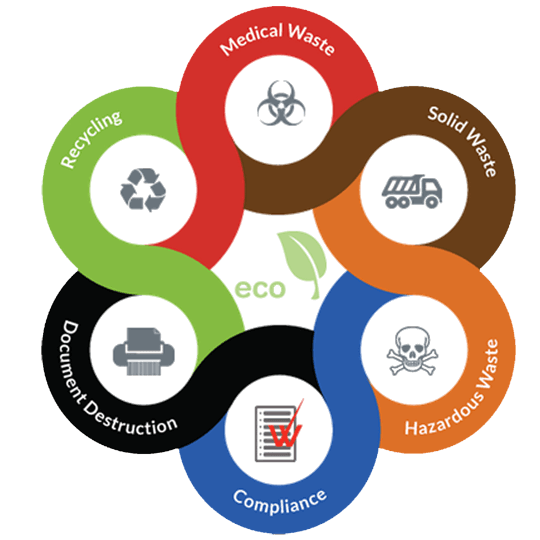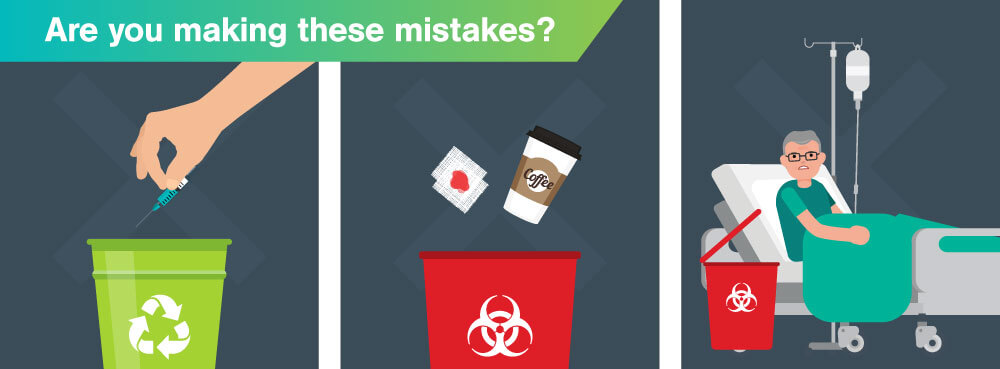Ensuring Safe Handling and Disposal of Medical Waste
Making sure risk-free handling and disposal of clinical waste is of critical significance in health care settings. Incorrect management of medical waste can present substantial dangers to the setting, public health and wellness, and health care workers. This requires adherence to rigorous guidelines and methods for its secure handling and disposal. In this introduction, we will explore the value of correct clinical waste monitoring, the dangers related to incorrect handling and disposal, as well as the standards and methods that can be executed to guarantee its safe disposal. Furthermore, we will certainly go over the relevance of training and education and learning for medical care experts in order to maintain a risk-free and clean healthcare atmosphere. By complying with these techniques, we can efficiently mitigate the possible hazards related to medical waste.
Importance of Correct Medical Waste Management
Correct medical waste management is of utmost relevance in making certain the safety and security and well-being of health care experts, individuals, and the basic public. Clinical waste refers to any type of waste created by healthcare centers throughout the medical diagnosis, treatment, or booster shot of pets or humans. This waste can position significant health threats if not taken care of and thrown away correctly.
One of the main reasons that appropriate medical waste administration is critical is to stop the spread of transmittable conditions. Medical waste, such as used needles, contaminated dressings, and organic materials, can carry unsafe virus. If not taken care of and gotten rid of correctly, these microorganisms can be transmitted to healthcare employees, clients, waste trainers, and also the public, leading to the potential break out of illness.
In addition, proper medical waste administration assists shield the setting - medical waste disposal. Clinical waste contains dangerous materials, including chemicals, pharmaceuticals, and contaminated materials. When not handled appropriately, these materials can infect dirt, water bodies, and the air, presenting a considerable danger to communities and public wellness
Moreover, reliable clinical waste monitoring guarantees conformity with neighborhood policies and worldwide criteria. Federal governments and regulatory bodies have actually established standards and procedures to make sure the secure handling, storage, transport, and disposal of medical waste. Complying with these policies is necessary to stay clear of legal effects and keep the reputation and integrity of health care facilities.
Risks of Improper Handling and Disposal

If medical waste is not correctly disposed of,Patients can also be revealed to these contagious diseases. If polluted needles or other sharps are not disposed of in assigned puncture-proof containers, they might inadvertently puncture patients, leading to possible infections. Furthermore, if medical waste is not set apart appropriately, there is a danger of cross-contamination in between different kinds of waste, additional increasing the possibilities of condition transmission.
Incorrect disposal of clinical waste can likewise have detrimental results on the environment and the general public. If clinical waste is not dealt with and gotten rid of appropriately, it can contaminate water resources, soil, and air, leading to the spread of contaminants and conditions. This can have long-lasting repercussions on ecological communities and public health and wellness.
Standards for Safe Handling of Medical Waste
Executing reliable procedures for the secure handling of clinical waste is necessary in ensuring the protection of health care professionals, patients, and the public. These standards are vital in lessening the risks associated with the handling and disposal of clinical waste, such as infections, injuries, and ecological pollution.
Most importantly, medical care facilities should develop a detailed waste monitoring plan that follows neighborhood, nationwide, and international laws. This plan should include clear instructions on waste segregation, packaging, transport, storage, and labeling. It is essential to divide different sorts of waste, such as sharps, transmittable materials, drugs, and non-hazardous waste, to avoid cross-contamination and promote safe disposal.
Additionally, healthcare workers need to receive detailed training on appropriate waste handling techniques. They ought to be informed on the possible hazards of medical waste, the suitable use of personal protective equipment (PPE), and the appropriate procedures for taking care of, delivering, and getting rid of various types of waste.
Furthermore, medical care centers need to frequently keep an eye on and examine their waste management practices to make certain compliance with standards. This includes conducting normal assessments, reviewing waste handling treatments, and offering comments and training to team member.
Reliable Approaches for Waste Disposal
To make sure the safe handling and disposal of clinical waste, it is necessary to employ effective approaches for garbage disposal. Clinical waste can posture significant dangers to public health and the setting otherwise dealt with and gotten rid of properly. Health care centers and waste administration organizations have to implement proper techniques to mitigate these risks.
It entails separating different kinds of medical waste based on their features. Health care centers must offer clear standards and training to team members on how to segregate waste appropriately.

Additionally, healthcare centers must team up with qualified waste administration business to guarantee correct disposal of clinical waste. These firms have the proficiency and devices needed to safely take care of and dispose of medical waste in compliance with laws and finest practices.
Training and Education And Learning for Medical Care Professionals
Health care professionals play a vital function in making certain the risk-free handling and disposal of clinical waste with comprehensive training and education and learning. It is crucial for health care carriers to have a deep understanding of the prospective dangers connected with clinical waste and the appropriate methods for its management. By obtaining proper training, medical care specialists can minimize the possible transmission of contagious conditions, protect against environmental contamination, and protect both themselves and the basic public.

Moreover, training programs ought to stress making use of individual protective equipment (PPE) and correct hand health practices when managing medical waste. medical waste disposal service. Healthcare specialists must recognize just how to properly get rid of and use of PPE to shield themselves from prospective exposure to dangerous products. They need to also be enlightened on the relevance of routine handwashing and the proper use hand sanitizers to minimize the spread of contagious illness
Continuing education and routine updates on medical waste monitoring practices are essential for medical care experts. As standards and laws develop, it is important to maintain medical care companies informed regarding any kind of changes in procedures and finest methods. This will make sure that they remain updated and preserve a high requirement of safety in getting rid of and managing of medical waste.
Verdict
Finally, proper handling and disposal of clinical waste is crucial to make sure the safety of health care experts, clients, and the setting. Ignoring to adhere to guidelines and policies can cause numerous risks and dangers. Applying reliable strategies for waste disposal and offering proper training and education for health care experts are important in maintaining a safe health care setting. By adhering to these techniques, we can alleviate the possible threats related to clinical waste.
Clinical waste refers to any type of waste created by medical care facilities throughout the medical diagnosis, therapy, or immunization of humans or pets. If medical waste is not segregated effectively, there is a risk of cross-contamination in between various types of waste, additional boosting the possibilities of illness transmission.
It is crucial to separate different types of waste, such as sharps, infectious materials, pharmaceuticals, and non-hazardous waste, to protect against cross-contamination and promote risk-free disposal. WasteX Medical Waste Disposal.
To guarantee the risk-free handling and disposal of clinical waste, it is important to use reliable techniques for waste disposal. Additionally, medical care centers ought to develop a normal waste collection and transportation routine to protect against waste build-up and minimize the risk of crashes or contamination.